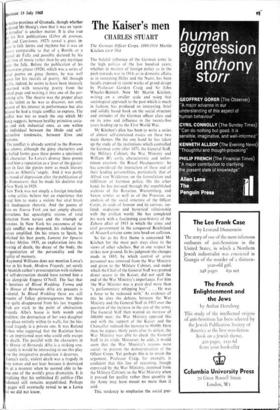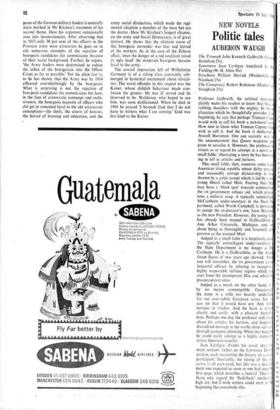The Kaiser's men
CHARLES STUART
The baleful influence of the German army in the high politics of the last hundred years, whether in matters of foreign policy as in the push towards war in 1914, or in domestic affairs as in sustaining Hitler and the Nazis, has been lucidly exposed in recent works of grand design by Professor Gordon Craig and Sir John Wheeler-Bennett. Now Mr Martin Kitchen, writing on a smaller scale and using that sociological approach to the past which is much in fashion, has produced an interesting, brief and solidly based book on the social structure and attitudes of the German officer class and on its aims and influence in the twenty-five years leading up to the First World War.
Mr Kitchen's plan has been to write a series of almost self-contained essays on these two main themes. On the one hand he has taken up the study of the institutions which controlled the German army after 1871, the General Staff, the Military Cabinet, the War Ministry and William H's early, characteristic and unfor- tunate creation, the Royal Headquarters: he has considered the interaction of these and of their leading personalities, particularly that of Alfred von Waldersee, on the formulation and fulfilment of German policy. On the other hand, he has pursued through the unpublished archives of the Bavarian, Wurtemburg, and Saxon armies as well as of the Prussian, an analysis of the social structure of the Officer Corps, its code of honour and its curious, iso- lated, suspicious and hysterical relationship with the civilian world. He has completed his work with a fascinating case-history of the Zabern affair of 1913 in which the army and civil government in the conquered Reichsland of Alsace-Lorraine came into head-on collision.
So far as his first theme is concerned Mr Kitchen for the most part stays close to the views of other scholars. But in one respect he strikes new ground. In his judgment the changes made in 1883, by which control of army personnel was removed from the War Ministry and given to the Military Cabinet, and under which the Chief of the General Staff was granted direct access to the Kaiser, did not spell the end of the War Ministry's importance. For him 'the War Minister was a great deal more than "a parliamentary whipping boy" . . . He was a force to be reckoned with.' As evidence of this he cites the debates between the War Ministry and the General Staff in 1913 over the question of the increase in the size of the army. The General Staff then wanted an increase of 300,000 men: the War Ministry opposed this and with the support of the Kaiser and the Chancellor reduced the increase to 90,000. Here then, he argues, thirty years after its defeat, the War Ministry was able to check the General Staff in its stride. Moreover, he adds, it would seem that the War Ministry's reasons were social—to prevent the democratisation of the Officer Corps. Yet perhaps this is to strain the argument. Professor Craig, for example, is confident that this line of reasoning, though expressed by the War Ministry, stemmed from the Military Cabinet; so the War Ministry when it pressed for quality rather than quantity in the Army may have meant no more than it said.
This tendency to emphasise the social pur- poses of the German military leaders is naturally more marked in Mr Kitchen's treatment of his second theme. Here his argument occasionally runs into inconsistencies. After observing that in 1913 only 30 per cent of the officers in the Prussian army were aristocrats he goes on to cite numerous examples of the rejection of bourgeois candidates for commissions because of their social background. Further, he argues, the Army leaders were determined to reduce the influx of the bourgeoisie into the Officer Corps as far as possible.' Yet the plain fact is, as he has shown, that the Army was by 1914 officered overwhelmingly by the bourgeois. What is surprising is not the rejection of bourgeois candidates for commissions but how, in the face of aristocratic contempt and exclu- siveness, the bourgeois majority of officers who did get in remained loyal to the old aristocratic conceptions—the duels, the courts of honour, the hatred of learning and education, and the crazy social distinctions which made the regi- mental chaplain a member of the mess but not the doctor. Here Mr Kitchen's longest chapter, on the army and Social Democracy, is of great interest. He shows that the ultimate cause of this bourgeois surrender was fear and hatred of the workers. As in the case of the Zabern affair, 'once the danger of a red coalition raised its ugly head' the moderate bourgeois became loyal to the army.
The overall impression left of Wilhelmine Germany is of a ruling class constantly sub- merged in hysterical excitement about triviali- ties. The worst offender in this respect was the Kaiser, whose childish behaviour made con- fusion the greater. He was ill served and he deserved to be. Waldersee, who hoped to use him, was soon disillusioned. When he died in 1904 he prayed 'I beseech God that I do not have to witness what I see coming.' God was less kind to the Kaiser.







































 Previous page
Previous page